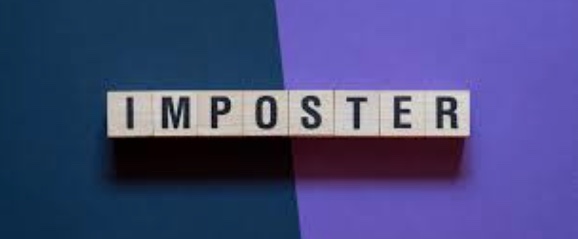Pulling Back the Curtain on Imposter Syndrome
Last summer Meghan and I both noticed the theme of imposter syndrome* popping up in our work. Meghan was noticing an uptick in mentions of imposter syndrome in the teams and individuals she was working with. I was seeing it in the context of our work together and was also bringing years of working in a bigger system where I saw many women openly talk about or mention grappling with imposter syndrome.
I had felt it too, typically when adjusting to elevated responsibility or a new role. Even though my experience was that it was a phase and the feeling always passed, I called it imposter syndrome. It was easy to adopt the buzzy catchphrase – one that seemed universally understood and externally validated and reinforced. I saw articles where celebrities mentioned imposter syndrome, and even read that the great Dr. Maya Angelou expressed that despite having written eleven books she worried she’d “run a game on everybody, they’re going to find me out.” An olympic gold medal won’t banish gnarly imposter feelings, as gymnast Suni Lee revealed she experienced imposter syndrome, too.
I was inspired to put pen to paper after I read Adam Grant’s Think Again and started a blog post last summer. Grant framed up research by Basima Tewfik who found there was no significant difference between the competence of those who feel imposter feelings versus those who do not. In other words, imposter syndrome is rooted in confidence not competence. Coupled with the research findings, he offered productive ways to think about imposter syndrome.
Though excited by the research Grant presented, I had a nagging sense that my working blog post was not quite right. I was bothered by the word ‘syndrome.’ I found myself wondering why the need to pathologize a feeling many people were experiencing? Especially given that imposter syndrome tends to be experienced more by women and by those who identify as non-white.
Eventually the topic slipped from my mind, until I recently came across an article by Ruchika Tulshyan and Jodi-Ann Burey, “Stop Telling Women They Have Imposter Syndrome”. It was like bells rang when I read their piece, as Tulysan and Burey put language to what I could not. They spoke to the why of imposter syndrome – why it exists in the first place, why it is so ubiquitous for women, and why we label it a syndrome.
As they write,
“[T]he medical undertone of ‘syndrome’ … recalls the ‘female hysteria’ diagnoses of the nineteenth century. Although feelings of uncertainty are an expected and normal part of professional life, women who experience them are deemed to suffer from imposter syndrome. Even if women demonstrate strength, ambition, and resilience, our daily battles with microaggressions, especially expectations and assumptions formed by stereotypes and racism, often push us down. Imposter syndrome as a concept fails to capture this dynamic and puts the onus on women to deal with the effects. Workplaces remain misdirected toward seeking individual solutions for issues disproportionately caused by systems of discrimination and abuses of power.”
As one who believes you cannot solve a problem without naming and understanding it, I felt like part of the problem was named: it’s not necessarily women, it is the systems designed to protect those in power. Why was the burden of overcoming doubt in the workplace (especially when cultural and behavioral norms have been set for generations by white men) shifted to women? And further disproportionately shifted to women who identify as non-white?
As Tulyson and Burey write, “the answer to overcoming imposter syndrome is not to fix individuals but to create an environment that fosters a variety of leadership styles and in which diverse racial, ethnic, and gender identities are seen as just as professional as the current model.” It feels a bit like I watched Tulyson and Burey arrive to the Land of Oz and pull back the proverbial curtain, and it changed the way I think about imposter syndrome and what can be done about it.
At MECC our work sits at the intersection of culture and strategy, and we do just what Tulyson and Burey say is needed to overcome and dismantle the pervasive myth of imposter syndrome: we work with leaders, host dialogues, ask challenging questions, shepherd individuals and teams to look within themselves, and generally work our tails off and pour our hearts into creating environments of belonging that foster diverse leadership styles.
Productive Ways to Address Imposter Syndrome
As we know, systems will not change overnight. At MECC we believe in a “both/and” approach, meaning that systems need to change, and we need to move forward productively in the midst of that change. Here are a few resources to think differently about imposter syndrome and address those fears or insecurities associated with it.
Mentioned above, Basima Tewfik’s research and Adam Grant’s analysis in Think Again provided ways to channel the feelings associated with imposter syndrome into something productive:
- Feeling like an imposter can enable us to harness the idea that we have something to prove and can motivate us to work harder;
- With fear nagging at us that we are not good enough in the first place, imposter syndrome can make us work smarter, bringing us to question assumptions and ways of doing things that we may otherwise take for granted, propelling us to creatively re-think our strategy or approach;
- Feeling like an imposter can take us off a proverbial pedestal and put us in a learning mindset – making us open to new ideas.
This article by our colleague, John Rex offers four steps to transforming your mindset, including meditation. As a daily meditator, I wholeheartedly recommend the power of a few minutes of stillness each day to invite in a higher version of ourselves that offers respite from our inner critic.
I plan to ditch the “syndrome” title and center myself in what I know be true: it is okay to be a learner, we often learn through mistakes, and our greatness always lies beyond what scares us. Case in point: I worried about my qualifications or experience to write about imposter syndrome. It may have taken me six months and three versions, but here it is.
Have you transcended the feelings of imposter syndrome? Submit a comment below.
- Read the article by Ruchika Tulyson and Jodi-Ann Burey here: https://hbr.org/2021/02/stop-telling-women-they-have-imposter-syndrome
- Check out Think Again by Adam Grant…a thought-provoking read for anyone interested in cultivating a learner’s mindset
* Imposter Syndrome is commonly described as doubting your abilities, feeling like a fraud, or believing like your success has not been legitimately achieved.





Leave a Reply
Want to join the discussion?Feel free to contribute!